
Even though your teeth are made out of the hardest material in your body, they can still decay and become damaged. If this issue continues, it could expose the sensitive inner portion of your tooth, causing even more serious problems and pain in your mouth. At Jacksonville Dental Specialists, our team uses custom-made dental crowns in Jacksonville to restore your teeth back to their natural beauty and function. Read on to see how these life-like restorations can improve your smile.
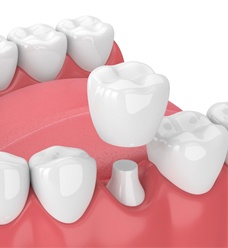
Dental crowns are prosthetic caps that are designed to cover the entire visible portion of your tooth. This allows for the restored appearance of your smile, but it also restores your biting power and strength. Unlike other restorations, dental crowns in Jacksonville are permanently bonded to your tooth, allowing for a long-lasting and stable restoration. Crowns can be made out of various types of materials, but we use high-quality ceramics to deliver you a restoration that looks and feels like your natural smile.
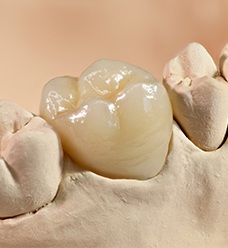
Dr. Matthew Nawrocki and Dr. Richard Aguila use dental crowns because they:
If it sounds like you could benefit from restoring your teeth with dental crowns, contact our office today. One of our highly-trained dentists will examine your mouth to provide you with a personalized treatment plan.

The only way to ensure that you’re a candidate for crowns is to visit our office, but you are typically a candidate if you need to:
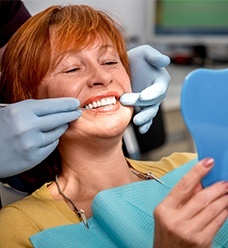
Once Dr. Nawrocki or Dr. Aguila decide that a dental crown is the best solution for your decayed or damaged tooth, they will clean the area of any decay and begin the placement process. They will remove a small amount of tooth enamel to accommodate your restoration and then take impressions of your smile to create a customized crown that matches your natural teeth. You’ll be given a temporary crown to wear until your permanent one is fabricated, then you’ll come back to our office where we’ll permanently place your dental crown.

Dental crowns are deluxe restorations that can help repair a cracked or decayed tooth that has too much damage for a traditional filling. The cost of your crown can depend on a variety of things, including the materials used, what other type of procedure you may need first (such as a root canal), and whether your dental insurance covers any of the treatment.
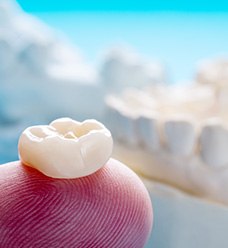
There are many factors that could affect the cost of your dental crown. These include:
It is important to note that just because a crown is “cheaper” doesn’t mean that it’s a better value. When it comes to something that will be going in your mouth, quality is important. Your new prosthetic should look natural, but it should also feel comfortable and be durable enough to last for many years to come.
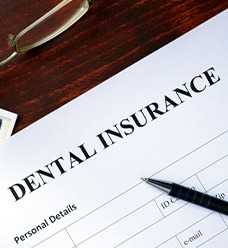
Yes, most dental insurance plans should cover dental crowns at about 50 percent of their cost if they are deemed medically necessary by your dentist. Our friendly dental team can help you confirm your benefits before we begin treatment so you know exactly what your expected contribution will be.
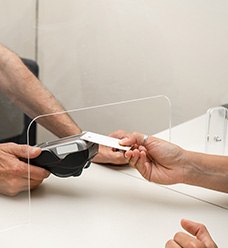
At Jacksonville Dental Specialists, we are not contracted with any insurance plans or Medicaid, but we will certainly be happy to file on behalf of any of our patients who have a PPO plan and help them maximize their benefits. We also accept convenient financing through CareCredit and Lending Tree.
We want to assist you in managing the cost of this extremely important treatment, so please don’t hesitate to schedule a consultation to further discuss your financial options
Before beginning your treatment, your dentist will make sure to completely numb the tooth they’ll be working on, that way you remain comfortable throughout your appointment. In many cases, patients may simply need a topical anesthetic for a pain-free experience. That said, if you’re feeling nervous or anxious about your visit, we can provide you with sedation dentistry to help you relax. While your tooth may be numbed for the preparation portion of your procedure, this may not be necessary for the final crown placement. You might experience some sensitivity for several days after your treatment, but this can easily be managed with over-the-counter pain relievers and by rinsing with lukewarm water.
Dental crowns can’t develop cavities, as they aren’t made of the same organic material as your permanent teeth. However, the underlying tooth can still be susceptible to harmful bacteria without proper care. In fact, crowned teeth have nearly the same risk of decay as uncrowned ones. Even so, you can take several measures to help prevent cavities altogether. Make sure to practice good oral hygiene every day to keep bacteria and plaque from collecting around your teeth and gum line, especially where the tooth meets the crown. You should also visit our office routinely for checkups and cleanings biannually and keep a well-balanced diet.
With proper care, your dental crown in Jacksonville can give you at least 15 years of beauty and strength. This will depend entirely on your oral health and how well you maintain your results over the years. To ensure the success of your dental crown, you’ll need to brush twice a day, floss at least once daily, and visit our office biannually for dental checkups and cleanings. You should also avoid chewing on any nonfood items because they can crack your crown (and your natural teeth).
Although your dentist is the main one to determine if your crown needs replacing, here are a few important indications that your restoration is nearing the end of its lifetime:
Dark line at the base – The porcelain layer from porcelain-fused-to-metal crowns may wear down over time, exposing the metallic portion. This is a common sign that you should replace your restoration.
Metal and porcelain-fused-to-metal crowns can be a problem for MRI machines. The metal materials in these restorations are known to interfere with MRI magnetic fields and radio waves, resulting in distorted images that make accurate diagnosis difficult (or downright impossible!).
Fortunately, your Jacksonville dentist crafts dental crowns out of all-ceramic materials. Since they’re completely devoid of metal, you won’t have to worry about your tooth-colored crown causing MRI issues.
Rest assured, our team will take every step to ensure your custom crown fits comfortably and feels natural. This includes taking meticulous impressions of your smile, reshaping the tooth that will be underneath your crown, and using durable materials designed to endure everyday speaking and eating.
It might feel a little strange to suddenly have a full, evenly shaped tooth at first, but over time, you’ll hardly notice the difference between your crown and natural teeth. If your crown doesn’t seem to fit quite right, please let us know so we can make adjustments and restore your comfort.
Teeth whitening agents are specifically formulated to slip past the pores in natural dental enamel. In other words, they’re not effective on inorganic materials like porcelain and ceramic.
While our tooth-colored materials are stain-resistant, they can still become discolored. If your smile needs a glow up, we recommend proceeding with a teeth whitening treatment as normal. Once your natural teeth are a shade you’re pleased with, we can polish or replace your crown to match your other pearly whites.
Basically, a temporary crown is designed to be, well, temporary. Your permanent crown will be made out of sturdier materials, and we’ll adhere it to your tooth with a firmer dental cement.
It will take some time for our trusted partners at the dental lab to customize your permanent crown, and we want to make sure your weakened tooth is well-protected while you wait. A temporary crown is hardy enough to shield your tooth, but also easy to remove so we can replace it smoothly. As a result, temporary crowns break and come loose more easily than their permanent counterparts. You’ll have to brush and floss carefully and stick to eating softer foods until we provide you with your final restoration.